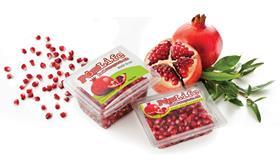
Although running a few weeks late, the Australian pomegranate season is looking like a high-quality crop, according to industry sources.
“We expect production to be short in volume and that will be reflected in prices, due to unseasonal rains and storms in many production areas,” Omid Rad of Group Kinetica, which markets PomPersia-branded pomegranates, told Produce Plus.
“Four of our eight farms had around a 40 per cent loss of flowers and we expect that would be reflected country-wide. It was wet, so those farms that were struggling with dieback [disease] may see some losses this year.”
Joshua Reuveni of Goulburn Valley-based Pomlife said fruit on its Shepparton farm is maturing as expected.
“Across all growers, we expect picking to be a bit later than previous years and should start in late march,” Reuveni said. “In coming seasons, we will be focusing on improving our growing practices, improving the overall fruit quality, expanding plantations and putting more effort into cool storage.
“We want to expand our season, by planting earlier varieties and also putting more capital into cold storage to extend the season so we can better bridge the gap with US imports.”
Demand for pomegranates has continued to grow in Australia, with pre-packed arils and value-added products proving popular for the food service industry.
Pomlife supplies fast food chains and restaurants year-round with local and imported fresh fruit and arils, and uses 100 per cent Australian-grown fruit in its range of value-added products including juices, frozen arils, pomegranate powder and chocolate-coated arils.
“Consumers like that our products are made from Australian stock, and for frozen fresh produce in particular, it’s not common to find Australian frozen produce,” Reuveni said. “We’ve sold three times more stock of frozen arils than we expected and feedback has been good.”
This year, Pomlife is expanding its distribution of fresh arils, now covering South West Victoria, Queensland, South Australia and Western Australia. It also promoted its pomegranate powder as part of a post-workout recovery drink at Nitro Athletics Melbourne. The Coles sponsored event saw Pomlife take part in a stand with other Greater Shepparton producers, offering athletes pomegranate powder and juice.
“As a company, we always keep in mind that our motto is to promote health and wellbeing and that’s what makes my job enjoyable and diverse,” Reuveni explained. “We’re in discussion with elite and ex-athletes from Australia to promote pomegranate powder. We make sure our products retain the vitamins and minerals found in pomegranates that research shows have excellent recovery attributes for people after gym sessions or exercise.
“It was a great event to put our product out there, but also a great honour to support local sports.”
Reuveni says Pomlife’s dark chocolate-coated arils are another product made with health in mind, with the high cocoa content of the dark chocolate a healthier option.
Propagation plans Group Kinetica has doubled its number of trial farms since last year, with four more planned in Far North Queensland, southern Queensland and Western Australia. Supplying growers with trees free of charge, Group Kinetica’s growers are able to trial new pomegranate varieties, with the produce then marketed under the PomPersia brand.
“Four of our trial farms will be producing commercial quantities of pomegranates by the end of 2019/20. So we will have about 100ha under commercial production, all marketed under the PomPersia brand,” Rad said.
Group Kinetica is also working on a propagation centre to produce around 100,000 trees each year from its collection of pomegranate varieties sourced from around the globe.
“We’re also working on a centralised education hub for farmers to access material on best growing practices,” Rad said. “We’re also looking at opportunities for growers to visit the centre twice a year to gain hands on experience in growing pomegranates.”
California imports fall
The California pomegranate export season was cut short with long-term drought affecting fruit sizing, seeing a drop in shipments in Australia.
Industry estimates put total crop volume about 25-30 per cent lower that last season with drought leading to smaller fruit sizes, unseasonal rain leading to cracked fruit and black heart fungal disease in the crop.
“Generally, in summer there’s high demand for the fruit in salad and lighter dishes and overall, we had a good season of imports, but the US dollar to Australian dollar made the product very expensive,” explained Reuveni. “That said, we have a commitment to our customers to provide a full season and ensure that we deliver good quality, high Brix fruit.”
Despite the short crop, some importers faired better, with Valleyfresh seeing a 40 per cent increase in sales growth for its imports of California-grown pomegranates from SunnyGem – a record import season for the company.
“Despite the challenges this season, we were able to work together [with SunnyGem] to achieve the best quality season we have had to date. Our North America field staff were present throughout the entire packing procedure in the US – this has been the key to achieving fantastic quality packs,” explains Valleyfresh’s Simon Powell.
“We struggled to keep up with market and retail demand this season. We shipped 40 per cent more fruit and supplied a month later than previous seasons, capturing for the first time strong Chinese New Year sales in January.”
This article was originally published in the autumn edition of Produce Plus, out now



